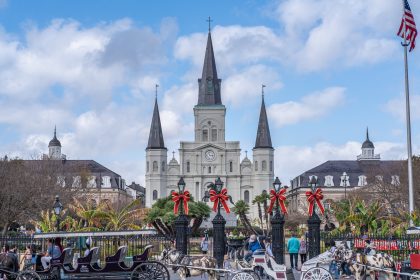The potential sale of New Orleans’ Couvent School complex signals another loss for a community that has witnessed the steady erosion of Black cultural landmarks. The Archdiocese of New Orleans‘ decision to sell this historic Black Catholic institution — announced Dec. 22 — threatens to sever ties with nearly two centuries of African American educational excellence.
A cornerstone of Black excellence since 1832
The Couvent School, originally the Institute Catholique, represents more than just brick and mortar. During the antebellum period — when educating Black children was heavily restricted or outright forbidden in many parts of the South — this institution stood as a beacon of resistance and hope. The school’s influence extended through the Reconstruction era, producing leaders like Rodolphe Lucien Desdunes, who fought against racial oppression when many of today’s civil rights organizations were just beginning to form.
The institution’s founding story reflects the complex nature of race relations in 19th-century New Orleans. Marie Couvent — despite her own participation in the system of slavery — established an enduring legacy of Black education. Her 1832 will explicitly protected the property from sale, a provision that has safeguarded the institution through generations of social upheaval.
The battle between preservation and profit
The archdiocese’s move to sell the property for $1.1 million to Cambronne Real Estate emerges from its need to address clergy abuse settlements through bankruptcy proceedings. This decision exemplifies a broader pattern of historically significant Black institutions being sacrificed for financial expediency.
The proposed sale price of $1.1 million undervalues both the property’s historical significance and its potential future impact. A competing proposal from the Couvent Collective offered $1.9 million and presented a vision for continuing the school’s legacy of community service. Their comprehensive plan aimed to create opportunities for women and other underserved groups while preserving this crucial piece of African American heritage.
Preserving Black educational legacy
Since 2017, the Couvent School complex has stood inactive, its halls silent but its legacy very much alive in the memories of generations who passed through its doors. The property’s fate now rests with a bankruptcy judge, who must weigh Marie Couvent’s explicit wishes against the archdiocese’s current financial obligations.
The situation mirrors countless other instances where Black historical sites face erasure through commercial development or institutional financial decisions. The struggle to preserve Couvent School represents more than just saving a building; it’s about protecting a tangible connection to a time when Black education was an act of resistance and self-determination.
The property’s potential transformation into the Couvent Collective would honor its original mission while adapting to contemporary needs. This vision includes creating spaces for community development, educational programs and economic opportunities — continuing the school’s tradition of uplifting the Black community through education and empowerment.
Moving forward while honoring the past
The fate of Couvent School transcends simple real estate transactions. It raises critical questions about preserving Black cultural heritage in an era of rapid urban change and institutional restructuring. The archdiocese’s decision to sell this historic property challenges us to consider how we value and protect sites of Black historical significance.
As the legal proceedings unfold, the community’s response demonstrates the enduring importance of institutions like Couvent School. The groundswell of support for preserving the property shows how these historical spaces continue to resonate with those who understand their significance in the ongoing struggle for educational equity and cultural preservation.
The story of Couvent School reflects broader challenges facing historical Black institutions nationwide. As cities evolve and financial pressures mount, protecting these cultural landmarks becomes increasingly crucial. The outcome of this legal battle will set a precedent for how similar historical properties might be protected — or lost — in the future.
The preservation effort represents more than nostalgia; it’s about maintaining spaces that remind us of our capacity for resistance, growth and community building. Whether through the courts or community action, the fight to save Couvent School demonstrates that the spirit of educational empowerment that Marie Couvent envisioned remains vital and necessary in contemporary society.












